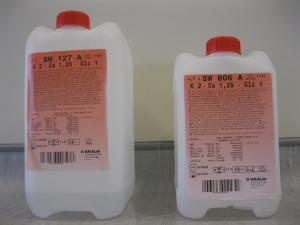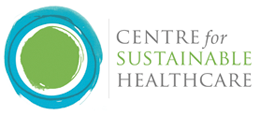- Group home
- You must register/login in order to post into this group.
44:1 Haemodialysis Concentrate Solution

By: East Kent Hospitals University NHS Foundation Trust
Carbon savings from transport of smaller volumes of concentrate. In addition, using a 4.7ltr can rather than a 6ltr can will mean a reduction in manual handling effort for the renal unit staff transporting the concentrate solution from the store to machine. Also, a pallet holds 128 cans of 44 to 1 concentrate compared to 90 cans of the larger 34 to 1 concentrate can thus reducing the number of pallet movements and optimising storage area in the renal unit.
£0 (Actual)
16.22 tonnes (Estimated)
During haemodialysis, creation of the dialysate fluid requires a concentrated acidic solution of known constituents to be drawn into the machine. This solution is diluted with a set volume of purified water from a reverse osmosis unit to achieve the correct concentration. Our Trust had previously used cans of acidic concentrate which require a 34:1 ratio of dilution, i.e. 1 part concentrate to 34 parts water. This 34:1 solution is supplied in a 6 litre can. The same final composition can also be achieved using an alternative acidic solution with a concentration of 44:1 after some minor technical adjustments to the dialysis machine. This 44:1 solution can be supplied in a 4.7 litre can. The can size of each of the solution concentrations reflect a reasonable diluted volume to comfortably supply a 4-4.5 hour dialysis treatment.
Details of implementation
As the four most commonly used solutions were not available in the smaller container, the manufacturer BBraun was approached to develop the specific solutions with a 44:1 concentration in the required size container for the same cost and to provide advice on the minor technical changes needed to the dialysis machines.
The trust procurement and supplies department were consulted to arrange new product codes to be allocated to the new items when bulk ordering.
The dialysis machines’ settings were subsequently adjusted accordingly by the trust renal technicians to allow safe operation with the higher concentrations of solution.
The Higher concentration (44 to 1) solutions have been available for some time, although there are still a significant amount of treatments around the UK using the 34 to 1 can option. Switching to the 44 to 1 concentration cans is a relatively easy process at negligible cost and may be a more simple method of reducing concentrate solution storage without procuring and maintaining a more costly central acid delivery system.
Higher concentration dialysis solutions (44 to 1) are also available from other manufacturers and can be used in alternative brands of dialysis machine.
Benefits to environmental sustainability: Reduction in greenhouse gas emissions from road transport
The concentrate is manufactured and transported by road from Glandorf, Germany to Sheffield and from Sheffield to Kent. An estimate of the carbon savings from transporting smaller volumes can be made as follows:
Reduction of concentrate used per treatment = 6 to 4.7 litre can = 1.3 litres
Reduction of concentrate used daily in the Trust = 200 x 1.3 litres = 260 litres
Reduction of concentrate used annually = 260 x 312 days = 81,120 litres
Thus approximate weight each year = 81.1 tonnes
Glandorf to Sheffield = 960 km
Sheffield to Canterbury = 374 km
Total distance= 1334 km
Approximate annual reduction in greenhouse gas emissions from road freight:
= 0.14993 * x 81.1(tonnes) x 1334(km) = 16,220 kg CO2e / year = 16.22 tonnes CO2e / year
(* 2012 Guidelines to Defra/DECC's GHG Conversion Factors for Company Reporting (Annex 7, Table 7e))
This cost neutral initiative is primarily to reduce the burden to the environment in transporting dialysis consumables.
BBraun
Project entered to the Green Nephrology Awards 2012 - pdf poster available to download from http://sustainablehealthcare.org.uk/green-nephrology/resources/2012/09/green-nephrology-award-entries-2012-posters-g-n
